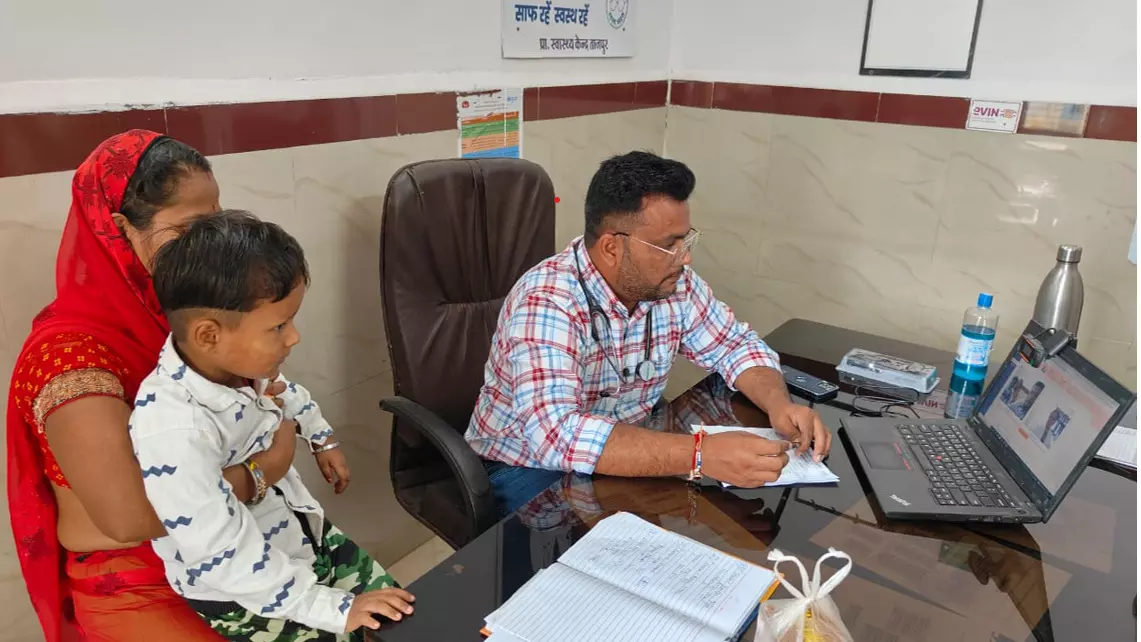Nexus of Good: Reaching the unreachable
The transformative teleconsultation programme under the National Health Mission-Madhya Pradesh has been ensuring timely delivery of quality medical services to remote areas

This initiative of reaching out to remote areas of the state through use of technology for providing medical consultation deservedly won the Nexus of Good Annual Award, 2023. Under the inspired leadership of Priyanka Das, Mission Director, National Health Mission (NHM), Madhya Pradesh, the model rides on public-private partnership, and that is one of the reasons for its success. The model is replicable and scalable.
Madhya Pradesh, often referred to as the heart of India, boasts a diverse and intricate geography that has long posed a challenge for delivering primary healthcare services, especially in rural and tribal areas where access to trained medical personnel is scarce. The COVID-19 pandemic exacerbated this challenge, shedding light on the increasing cases of Non-Communicable Diseases (NCDs) in the region. Recognizing the need for specialized healthcare services at the grassroots level, the National Health Mission, the Government of Madhya Pradesh (NHM-MP), initiated a transformative teleconsultation programme. This visionary programme aimed to provide timely access to specialists, particularly in obstetrics and gynaecology (OBGY), paediatrics, and general medicine department, thereby ensuring prompt diagnosis and treatment for better health outcomes.
The COVID-19 pandemic acted as a catalyst, driving the integration of teleconsultation and telemedicine into mainstream healthcare. It underscored the critical role of teleconsultation in delivering healthcare services during crises and brought lasting changes to the healthcare landscape. Teleconsultation emerged as a game-changer, extending the reach of healthcare, enhancing patient outcomes, reducing costs, and offering unmatched convenience for both patients and healthcare providers.
NHM-MP embarked on a mission to strengthen over 1,200 primary healthcare facilities by establishing teleconsultation services, thereby enhancing service quality and bridging the gap in healthcare accessibility. The key objective was to overcome the geographical challenges that had long hindered the timely delivery of quality medical services to remote areas.
To realize this vision, the state adopted a Public-Private Partnership model, ensuring the availability of crucial resources, including IT infrastructure, human expertise, and logistical support. Specialist consultation services were rolled out in two phases. The first phase commenced in June 2021, covering 550 primary health centres across 20 districts in three divisions. Subsequently, the second phase extended to the remaining 652 primary health centres, spanning 31 districts in four divisions, in August 2022.
This innovative model involved partnering with select agencies to establish multiple Hubs across the country, including cities like Kolkata, Delhi, Jaipur, Bhubaneswar, Lucknow, and Indore, among others. Each Hub was designed to cater to 20 Spokes, ensuring comprehensive coverage. Hubs were equipped with state-of-the-art IT infrastructure and facilities. They housed three Postgraduate Medical Officers (PGMOs) specializing in obstetrics and gynaecology, paediatrics, and general medicine, available on all working days from Monday to Saturday. Additionally, each Spoke had a dedicated lab technician, facilitating specialist teleconsultations and patient appointment scheduling.
Technology played a pivotal role in this initiative. The partnering agencies provided robust software solutions for teleconsultation, featuring video capabilities and Clinical Decision Support Systems (CDSS). Stringent adherence to Electronic Health Records (EHR) guidelines, as mandated by the Ministry of Health and Family Welfare, Government of India, and SNOMED CT, ensured the secure maintenance of medical records.
NHM-MP left no stone unturned in bolstering infrastructure at the Primary Health Centres (PHCs). These centres were equipped with essential amenities, including electricity, water supply, and dedicated spaces furnished with diagnostic kits, medicines, and patient engagement facilities. Bedding and scopes were provided to enhance patient comfort. Furthermore, NHM-MP ensured the availability of medicine, consumables, and laboratory reagents.
Recognizing the pivotal role of diagnostic services, NHM-MP established a Hub and Spoke lab investigation model. Community health centres and select primary health centres were designated as Hubs, while the rest became Spokes. Patients visiting PHCs for general or specialist consultations were offered a comprehensive array of 48 diagnostic tests. Additionally, centralized labs were set up at district hospitals, outfitted with modern machinery and advanced investigation technology.
Ensuring the quality of specialist consultation was a top priority. NHM-MP established audit committees at the divisional level, comprising subject specialists from the concerned medical colleges. These committees were chaired by Divisional Regional Directors across seven divisions. Every month, they audited 10 per cent of cases to assess consultation quality, focusing on adherence to the state Essential Drug List (EDL), state antibiotic policy, medication duration and dosage, lab investigations as per requirements, and consultation duration. These committees submitted their reports to the state. A state audit committee, headed by the Mission Director, NHM, was entrusted with implementing recommendations and suggestions from the divisional audit committees.
With this initiation, patients receive expert opinions and recommendations without the delays associated with physical referrals or waiting for specialists to visit the PHC. Patients often have to travel long distances to reach specialist healthcare facilities. Teleconsultation reduces the need for such travel, making healthcare more accessible and cost-effective for patients.
Since the commencement of specialist consultation, a total of 38.32 lakh consultations were provided, out of which 16.89 lakh were for general medicine, 9.9 for paediatrics, and 11.52 lakh for OBGY.
Teleconsultation has proved to be effective in providing specialist consultation for OBGY, paediatrics, and general medicine, with a remarkable increase in the appropriateness of primary care and integration with secondary care. The economic analysis, which included direct costs and savings related to in-clinic visits, diagnostic examinations, and specialist teleconsultations, showed a substantial economic balance.
The future plan for specialist teleconsultation for the state will be centred around continued technological advancements, improved patient-centred care, and increased collaboration among healthcare workers for better health outcomes. The state is exploring AI-enabled point-of-care devices that are compatible with teleconsultation for seeking super speciality services at the district hospital in collaboration with the Medical Education Department and All India Institute of Medical Sciences.
Views expressed are personal



